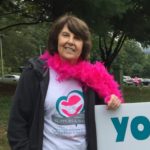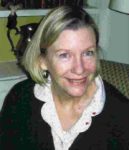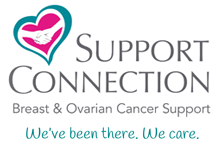 By Barbara Cervoni, LMSW, ACSW
By Barbara Cervoni, LMSW, ACSW
Director of Services and Communication, Support Connection, Inc.
What Is Cancer Survivorship?
Before I was diagnosed with breast cancer almost 4 years ago I thought I had a pretty good understanding of what the words “cancer survivor” meant. After all, for 11 years I’d been employed at Support Connection, a not-for-profit organization that provides free support services to women and families dealing with breast and ovarian cancer. I work closely with the Peer Counselors on our staff (counselors who are also cancer survivors) and know all about the women who reach out to them for support and guidance. I’ve spoken with countless survivors myself, writing and sharing their stories. I’ve used the word “survivor” time and time again. I thought I knew what it meant.
And then I became one – a cancer survivor. From the moment I heard the words “you have breast cancer” everything was different. It was like starting at ground zero. Most of what I thought I knew flew out the window. I realized right away I had a lot to learn about survivorship.
Defining cancer survivorship is complicated. It applies to so many people, in many different situations. The National Cancer Survivors Day Foundation defines a survivor as anyone living with a history of cancer – from the moment of diagnosis through the remainder of life.
But what does this mean? What exactly is survivorship? It might be easier to talk about what it isn’t.
Myths and Realities
Here are 5 commonly held myths about cancer survivorship:
Myth: When you’re done with surgery, chemo, and/or radiation, you’re “finished” being a cancer patient.
Many cancer survivors must take medications long after they complete acute treatment. Most continue to need medical follow-up for years. Doctor visits and tests may decrease in frequency, but they may never go away. For many survivors, the role of “patient” becomes lifelong, as does the specter of possible recurrence lurking someplace in the back of their minds.
Myth: After you “finish” treatment everything goes back to how it used to be.
Even short-term treatments can create permanent changes to your body. Treatments can have side effects that continue long after the final chemo infusion or radiation session, often lasting forever. Many people experience long-term emotional and social changes as a result of the fears and vulnerability a cancer diagnosis can bring. Some call this “the new normal.” In my view, there’s nothing normal about how I’ve changed since my diagnosis.
Myth: Someone who still has cancer in their body cannot be referred to as a “survivor.”
People with metastatic cancer also meet the definition of “cancer survivor.” Metastatic cancer is cancer that has spread from the primary site of origin into different area(s) of the body. Often, these long term survivors live with cancer for many years. They usually face treatment that is unending, aimed at stemming spread of the disease rather than complete eradication. Unfortunately, the needs of metastatic cancer survivors are often overlooked and left out of conversations about survivorship.
Myth: If you can just stay positive, everything will be ok.
There’s nothing inherently wrong with trying to stay positive. But it’s not always possible. Even when it is possible, it’s not as simple as flipping a switch. And a positive attitude alone is usually not all it takes to feel “ok.”
Myth: As a cancer survivor there’s nothing you can do to change how you feel physically or emotionally.
In my own experience, cancer changes who you are because it changes where you’ve been. And the changes are as much on the inside as on the outside. But it’s not necessary to simply accept this fact and concede defeat. Once you’ve acknowledged the changes, you can take proactive steps to make your life as a survivor the best it can be.
MOVING FORWARD
For me it started when I finished radiation. For months, all of my physical, emotional and mental energy was consumed by the need to understand my diagnosis, choose doctors, make decisions about treatment options, and fight this cancer that had invaded my body. Then that long-awaited last day of radiation came. Yes, I felt elated. But I also felt a bit disoriented, without direction. It was like coming home after a long journey through a very strange place and finding that home looks different than it did before. I thought: “Where have I been? What the heck just happened to me? And what do I do now?” It was time to start figuring out how to move forward with my “new” life as a cancer survivor.
At Support Connection we’re here to help breast and ovarian cancer survivors move forward, no matter where they are in their journey. Some need help when they finish that intense treatment period, like I did. Some seek support right after being diagnosed. Some look for help later on, even long after diagnosis. Some need help dealing with a cancer they’ll live with forever.
The key to moving forward? The most powerful tool we know is support. Knowing you’re not alone. Connecting with people who’ve walked the same path and can help you find your way. Finding answers from people who’ve asked the same questions you need to ask. Talking with people who understand the words you say before you even speak because they’ve said those words themselves. Support from your peers, your fellow cancer survivors, can transform feelings of helplessness and isolation into feelings of control and empowerment.
The Transformational Power of Support
Thousands of breast and gynecological cancer survivors have turned to Support Connection and received the support they needed to move forward. Here are a few of their stories (*excerpted from Survivors’ Stories on our website):
Kendra E.
 I had just turned 31 when I was diagnosed with a rare form of uterine cancer. A friend recommended I call Support Connection. I hesitated; I wasn’t even sure what I’d say. I wasn’t used to asking for help; I felt guilty about taking services I thought could be saved for “someone in greater need.” A few months later I realized exactly how great my own need was. I struggled with panic attacks and serious doubts about my ability to ever recover, both mentally and physically. I wanted to get back to normal but I didn’t even know what that was anymore.
I had just turned 31 when I was diagnosed with a rare form of uterine cancer. A friend recommended I call Support Connection. I hesitated; I wasn’t even sure what I’d say. I wasn’t used to asking for help; I felt guilty about taking services I thought could be saved for “someone in greater need.” A few months later I realized exactly how great my own need was. I struggled with panic attacks and serious doubts about my ability to ever recover, both mentally and physically. I wanted to get back to normal but I didn’t even know what that was anymore.
One afternoon, after another panic attack, I knew it was time to call. I will never, ever forget my first conversation with the Peer Counselor. In just one phone call she encouraged me to accept help and take advantage of their support services. Slowly but surely, as I got into a routine of attending support groups and exercising to regain some physical strength, I started to feel stronger and more confident both inside and out. Support Connection helped me overcome my doubts about being able to feel normal and healthy again.
Sandra B.
 In 2004 I was diagnosed with stage 1 breast cancer. I held my breath with every doctor’s visit and blood test waiting for the next shoe to fall. It fell 7 years later when my back pain proved to be bone metastasis. I was now stage 4, incurable with grim statistics. I was in shock, down a dark hole. I withdrew from family and friends. Even with a very supportive family it was me who had this horrible disease. I finally realized the people I loved were suffering too. That’s why I called Support Connection.
In 2004 I was diagnosed with stage 1 breast cancer. I held my breath with every doctor’s visit and blood test waiting for the next shoe to fall. It fell 7 years later when my back pain proved to be bone metastasis. I was now stage 4, incurable with grim statistics. I was in shock, down a dark hole. I withdrew from family and friends. Even with a very supportive family it was me who had this horrible disease. I finally realized the people I loved were suffering too. That’s why I called Support Connection.
Ever since, I’ve attended their advanced cancer support group. I’ve met the most incredible, courageous women. We discuss all of our concerns. We cry, we laugh. We learn so much from each other and feel such compassion and love for each other.
Yes, I am past my expiration date and enjoying my life as much as possible. I celebrate life’s sweetest moments doing the ordinary with the people I love the most. To my Peer Counselor: I love you and thank you for all you do – always giving your message of hope.
Sue J.
 When I was diagnosed with breast cancer my world stopped. What followed were hours on the internet and hours with doctors, then a bilateral mastectomy and chemo. After that came all the rest. The “problem” didn’t go away: I had little use of either arm; I had drains, painful chest expanders and no energy. No matter how many questions I asked the doctors I felt alone, scared and confused.
When I was diagnosed with breast cancer my world stopped. What followed were hours on the internet and hours with doctors, then a bilateral mastectomy and chemo. After that came all the rest. The “problem” didn’t go away: I had little use of either arm; I had drains, painful chest expanders and no energy. No matter how many questions I asked the doctors I felt alone, scared and confused.
When I called Support Connection and spoke to a Peer Counselor I found the first person who intuitively knew my thoughts and feelings! I was no longer alone. For the first time I cried. For the first time I could admit how afraid I’d been and still was.
After the operations and chemo people said: “It’s good you survived it all and can get back to your life.” My Peer Counselor understood we continue to live with effects of surgery and medications and the ongoing questions and concerns. She understood I wasn’t feeling sorry for myself but dealing with real issues. She helped me understand this too. She helped me return to being in control of my life rather than just acting like I was on the surface. My whole life became so much calmer and happier due to help from the wonderful counselors at Support Connection.
Amy B.
 I was diagnosed with breast cancer when I was 39. It was scary. My husband and I were already juggling the day-to-day challenges of working and taking care of our home and our 2 little girls. I was launched into a world of surgeries, treatments, and doctor’s appointments that seemed endless and all consuming. Surgery and chemo left me feeling weak. For the first time in my life I was forced to confront my own physical limitations.
I was diagnosed with breast cancer when I was 39. It was scary. My husband and I were already juggling the day-to-day challenges of working and taking care of our home and our 2 little girls. I was launched into a world of surgeries, treatments, and doctor’s appointments that seemed endless and all consuming. Surgery and chemo left me feeling weak. For the first time in my life I was forced to confront my own physical limitations.
I first reached out to Support Connection about their yoga program. I spoke with one of their Peer Counselors. She was kind and concerned. She asked me about my story and shared her story with me. It turned out we had a lot in common. Our conversation reminded me there are other women just like me.
At the yoga class I found more women who shared my circumstances. Many had been “through the mill” of cancer treatment like me and come out strong, positive, and empowered by their experiences. That yoga class made me stronger physically and emotionally. It reminded me I wasn’t alone and that there were other women who understood what I was experiencing.
When I was diagnosed with breast cancer again 5 years later, the old feelings of fear and isolation resurfaced. I reached out to Support Connection and – again — was reminded I’m not alone in this.
Just Call
These stories show that everyone comes to cancer survivorship from a different place, with needs as unique as the individual. I see parts of myself in each story and there are parts of my story I haven’t yet figured out. What I do know – and what’s common to all these stories – is that this journey would be much harder without my fellow survivors to help lead the way.
So if you or someone you care about is facing breast or gynecological cancer, I have one piece of advice from the heart: Call Support Connection. You don’t need to know what to say or what to ask. Just call. Our Peer Counselors will take it from there. You won’t be sorry, I promise.
